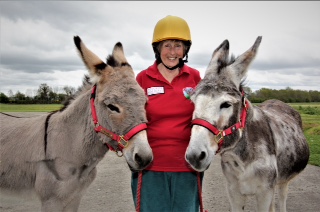Hello everybody
This is to thank everyone who supported the Donkathon by making scones and cakes, giving their time on the day and making donations to Multiple Sclerosis Research. This has resulted in £352.94 being contributed locally and, as the Donkathon has raised over £33,000 during the month of the journey, this is a wonderful total for such a good cause and I am grateful to all those who helped to make this possible.
Thank you, one and all!
ChristineBelow, you will find a link to download theand here is a song in Welsh from the service
Sunday reflection – Donkathon 2021
Reflection for the Donkathon
Sunday reflection
Reflection for Rural Mission Sunday
Sunday reflection
Sunday reflection
Reflection for the Fifth Sunday after Trinity
“Only in his hometown, among his relatives and in his own house is a prophet without honour.” Jesus, in Mark 6:1-13, NIV.
“The problem with the wife who has known you since way before you were king of the world is that she sees through your facade…… She knows that, deep down inside, you are not the Master of the Universe you purport to be.” Journalist Sarah Vine, as she and Cabinet Minister Michael Gove announce their separation.
July services and Donkathon
July 25th will hopefully see the arrival at St Melangell’s of Wizard and Muffin, the two donkeys being driven by Polly Vacher from Oxfordshire in aid of Multiple Sclerosis research. Their month long journey has needed careful planning and training for such a long distance – ginger biscuits are apparently key to the co-operation of Wizard and Muffin and the success of the entire enterprise! A donkey was also key to the journey of Joseph and pregnant Mary to Bethlehem and the entry of Jesus into Jerusalem on Palm Sunday, so this and poems or stories about donkeys will be part of the celebrations when Wizard and Muffin arrive. Their journey and the Donkathon song can be found on
or
where there are further details.
or
as seating will be limited:
Sunday reflection
“Those of us who make these rules have got to stick by them.” Matt Hancock, former Secretary of State for Health and Social Care in England, in his resignation statement.
Grab a jab – NHS slogan encouraging walk in Covid vaccinations.
Jesus has been approached by Jairus, a man of religious rather than political authority, who is desperate for Jesus to heal his unnamed, dying daughter aged twelve. Despite his status, he humbles himself by falling at Jesus’ feet, pleading for him to make her well – without a word, Jesus goes with him. As crowds follow them, another desperate person approaches Jesus, a nameless woman who has been haemorrhaging blood for twelve years. She is unclean and makes him unclean too by contact. In asking whoever touched his cloak to come forward, some of the disciples are amazed at this with so many people around him and the woman who has been shunned for so long now becomes the centre of attention. She fearfully finds the courage to be truthful about what happened and Jesus praises her for it, telling her that her faith has made her well. The woman is healed but, being delayed by this happening, his daughter has died when they eventually arrive – how hard that must have been for Jairus.
As a leader of the synagogue, Jairus has shown his faith in Jesus as courageously as the healed woman, but this must have been a test for them both as, being dead, his daughter is now also unclean. Jesus is mocked when he tells the mourners that the child is not dead but sleeping, telling Jairus not to fear but to believe. Jesus then takes the child by the hand, breaking the rules of his day, and tells the child to arise. She does, after which he tells her parents to give her food – this is not a healer concerned just for the immediate but for longer term wellbeing too.
In these two stories, both a pillar of the establishment and a social outcast come to Jesus and find healing through him, but not all the disciples are involved in this as only Peter, James and John are allowed to be present with her parents as Jairus’ daughter is healed. Was this linked to some of the disciples questioning him earlier? How did those left out feel about this? Being a disciple also requires humility and faith.
Both women are unnamed – as is Jairus’ wife – and their words are unrecorded but they are also linked by being restored to health after being unclean. The first is now able to return to public life after twelve years of isolation – perhaps caused by gynaecological problems of childbirth – and the other is restored to the threshold of womanhood in those days at the age of twelve. This happens because, for their sakes, Jesus is willing to be in contact with what has been deemed to be unclean so that healing will result, faith is answered and hope renewed.
Donkathon 2021
Its nearly time for the Donkathon SO do follow Polly’s daily blog on www.donkathon.org You can follow last minute preparations and then after 25 June you can watch the daily progress towards St Melangell in North Wales – Join the fun!


June 2021 Pastoral Letter (English)
FACE TO FACE
To the members of the Family of St Asaph
A Pastoral Letter for June 2021 from Bishop Gregory
It is exciting to have started the process of meeting up with people face to face once again. People who have been familiar only on the screen, and often not even that, are suddenly able to meet with me once again. I have been to see my parents at their home in south Wales, even if hugging was still not permissible at the time. It is so much richer to be in one another’s presence, to be able to take in the responses of gesture, body language and expression as well as the spoken word, unmediated by a screen.
Zoom – something of which I had barely heard at the beginning of 2020 – has served us well, particularly for business meetings, and I suspect that we’ll be keeping the format. However, our meetings have become more formal, there is little or no side talk, certainly not the opportunity to catch up with items that are not strictly business, but about enjoying friendship and support, or at least only in a very diminished way. The time is fast approaching for friendship to resume.
So too, there should be excitement in our faith. The Christian faith speaks of an intimate face to face encounter with God, which is distinctive in the world of faith. “Now we may see through a glass darkly”, wrote the apostle Paul, “but soon we shall see him face to face.” (1 Corinthians 13.12). He is speaking of our appearance before God at the end of time, and the journey towards God in faith, but this final encounter is not the only intimate meeting with God that is described in the New Testament. “In many and various ways God spoke to our forefathers,” wrote the author of the Letter to the Hebrews, “but in these last days he has spoken to us by a Son.” (Hb 1.2), and you can feel the excitement in the First Letter from John, “That One who was from the beginning, to whom we actually listened, whom we have seen with our own eyes, and touched with our own hands – he is the Word of Life.” (1 John 1.1). Christians believe that in Jesus, God came among us, to be touched and to touch, to heal and to set free, to redeem and to bear witness to love. I do believe that, by God’s grace alone, I shall see God face to face one day, but even now, I know that I am called into an intimate meeting with him in my heart – when God may minister to me, and I may lay the burdens of my heart before him. I am called to be a friend of Jesus – and you are as well.
In fact, if Jesus spoke true, we may find ourselves meeting him all over the place. “In as much as you did this for the least of one of my brethren” said Jesus of the service of generous love, “you did it as to me.” (Matthew 25.40). If we rejoice over the resumption of face to face encounters, so too we should rejoice over the promise of friendship with God, that begins now, even if it will come to fruition in its fullness only in eternity.
Actually, it looks as if even the unlocking of our national lockdown may take some time yet. As I speak, the Prime Minister has dialled up his uncertainty: June 21st may not be the day after all, and the delta variant may cause further delays. Even then, I suspect that our diaries will not fill in the old way – I find my colleagues expressing caution still about the return to worship, the organisation of in person gatherings, and the cycle of committee meetings. The ending of lockdown will come not with the throwing of a switch: “Hey presto, we are back to normality”, but with a slow testing out, of courage and caution in equal measure.
Like neighbours after a long and bitter dispute, we shall have to feel our way back to an equilibrium of contact with which we feel comfortable. Let us pray then for the organisers of meetings and events, and for the gift of wisdom. Let us pray that God will help us to go not too slowly, nor too fast; let us pray that medical knowledge and the science of immunisation may keep pace with the mutating virus, and let us pray that at each step, the relationships that we rebuild will be suffused with a deepened sense of faith, hope and love that enables us to see the face of Christ in friend and foe, in neighbour and in colleague, in stranger and in outsider.

Update
St Melangell’s Church and Centre are now beginning to reopen.
Please note: pre-booking is required due to space restrictions and social distancing regulations.
The St. Melangell Centre will reopen from Monday 28th June 2021.
The Church is now open for weekly Sunday services at 3PM.
From the start of July, a further biweekly service will be held on Thursdays at 12 noon, alternating with a zoom group. Holy Communion is offered at this service currently on a monthly basis. The communion for June is to be held this week on 17th June (amended from the planned date of 24th June). The next communion will be on 1st July.
The church will also be open for visitors and for private prayer.
All of the above still require pre-booking, social distancing, face masks and hand sanitation. This situation may change at any time, so please check again before travelling.

